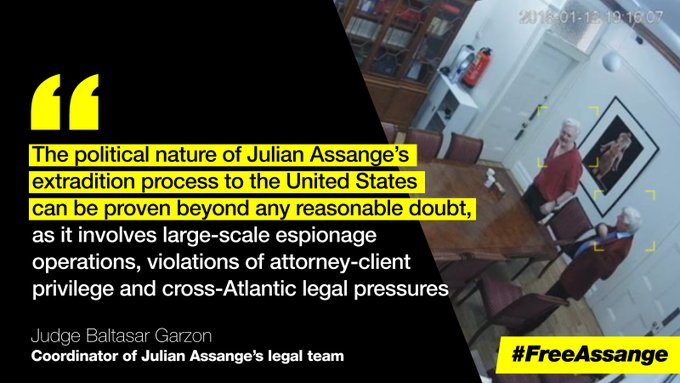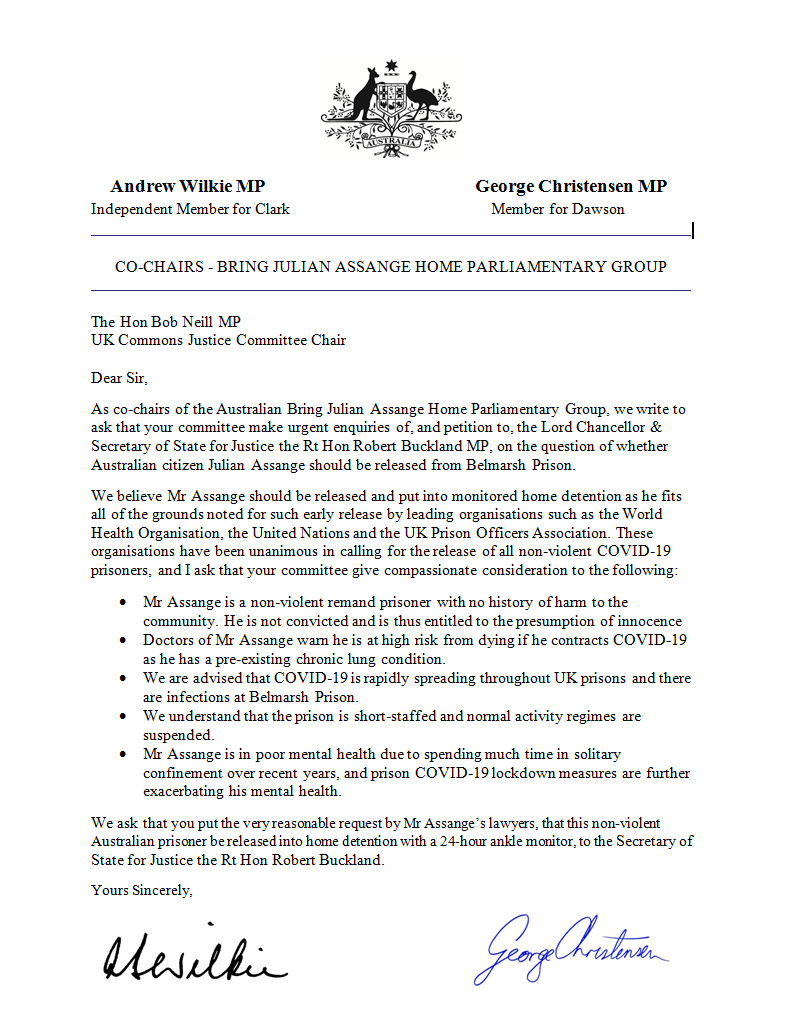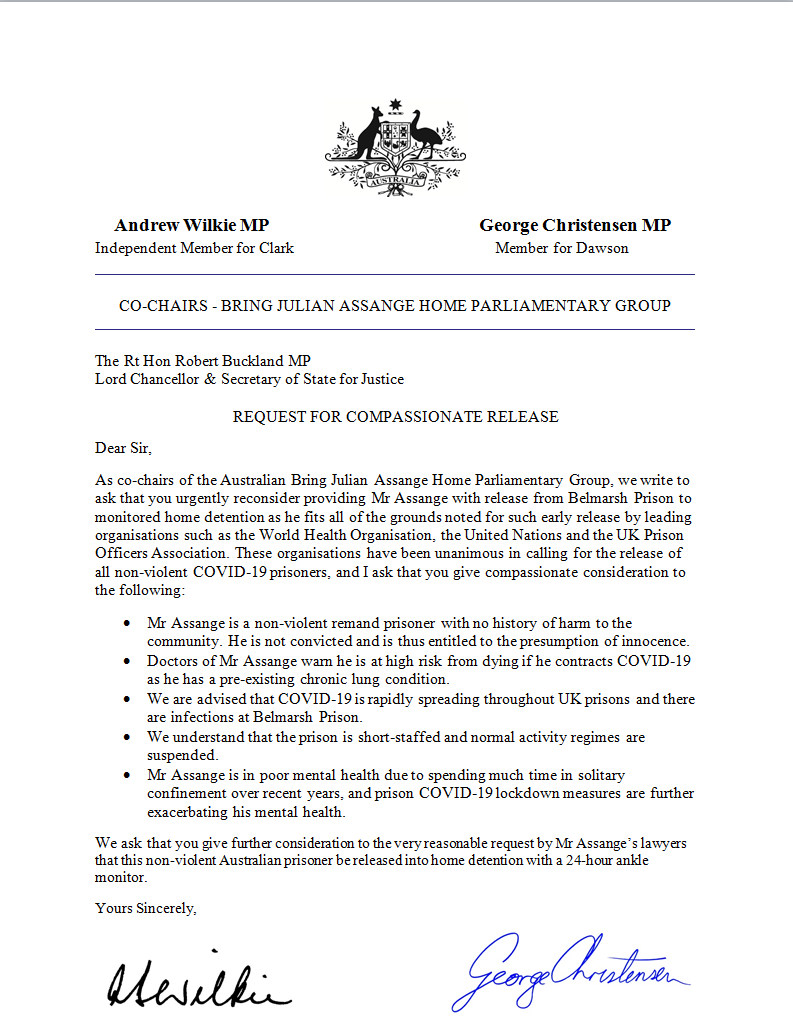March 27, 2020
Doctors4Assange strongly condemns Wednesday’s decision by UK District Judge Vanessa Baraitser to deny bail to Julian Assange. Despite our prior unequivocal statement[1]that Mr Assange is at increased risk of serious illness and death were he to contract coronavirus, and the evidence of medical experts, Baraitser dismissed the risk, citing UK guidelines for prisons in responding to the global pandemic: “I have no reason not to trust this advice as both evidence-based and reliable and appropriate.”[2]
Notably, however, Baraitser did not address the increased risk to Mr Assange relative to the general UK prison population, let alone prisoners at HMP Belmarsh where Assange is incarcerated. Nor did she address the rapidly emerging medical and legal consensus that vulnerable and low-risk prisoners should be released, immediately.
As the court heard, Mr Assange is at increased risk of contracting and dying from the novel disease coronavirus (COVID-19), a development which has led the World Health Organization to declare a public health emergency of international concern[3] and a global pandemic.[4] The reasons for Mr Assange’s increased risk include his ongoing psychological torture, his history of medical neglect and fragile health, and chronic lung disease.
Edward Fitzgerald, QC, representing Mr Assange, said, “These [medical] experts consider that he is particularly at risk of developing coronavirus and, if he does, that it develops into very severe complications for him… If he does develop critical symptoms it would be very doubtful that Belmarsh would be able to cope with his condition.”[5]
Baraitser’s casual dismissal of Mr Assange’s dire situation in the face of the COVID-19 emergency stood in stark contrast not only to the expert medical evidence, but the proceedings themselves. The hearing took place on the third day of the UK’s coronavirus lock-down. Of the two counsels representing Mr Assange, Edward Fitzgerald QC wore a facemask and Mark Summers QC participated via audiolink. US attorneys joined the proceedings by phone.
Mr Assange himself appeared by videolink, which was terminated after around an hour, rendering him unable to follow the remainder of his own hearing, including the defence summation and the District Judge’s ruling. Mr Assange’s supporters attending in person observed social distancing measures. Overall only 15 people were in attendance, including judge, counsel, and observers.
Baraitser further erred by stating that because no prisoners at HMP Belmarsh currently have coronavirus, Assange was not yet at risk. Mr Assange’s counsel noted, in contrast, that they had difficulty visiting him after being told by Belmarsh staff that over 100 Belmarsh employees are currently “self-isolating”. Furthermore, it is unclear whether any Belmarsh prisoners have even been tested for coronavirus.
Baraitser’s assurance that government measures were adequate to protect Mr Assange also rang hollow on the very day the UK government announced that Prince Charles tested positive for COVID-19. If the UK government cannot protect its own royal family from the disease, how can it adequately protect its most vulnerable prisoners in prisons, which have been described as “breeding grounds” for coronavirus?
Furthermore, news emerged on the day of the hearing that 19 prisoners in 10 prisons across the UK had tested positive for coronavirus, an increase of 6 prisoners in 24 hours.[6] From the time of the hearing to date, two UK inmates have died from COVID-19, both of whom, like Assange, are men in high risk groups.[7]
This news, and the decision to deny Mr Assange bail, is alarming in light of numerous statements and reports that have called out the risk to prisoners, urgently recommending release of non-violent prisoners, as well as actions taken by other nations to alleviate the risk.
Specifically, a March 17 report[8] by Professor of Public Health, Richard Coker of the London School of Hygiene and Tropical Medicine, found that “congregate settings” such as prisons provide ideal conditions for “explosive transmission” of coronavirus. “Hours matter” in terms of containment, Professor Coker warns. The report recommends that “if detention is unnecessary it should be relaxed. This should be done before the virus has a chance to enter a detention centre.”
Accordingly, on the same day as Mr. Assange’s bail hearing, the UN High Commissioner for Human Rights, Michelle Bachelet, issued a statement[9] calling on authorities to release prisoners who are particularly vulnerable to COVID-19, as well as low-risk inmates. “Now, more than ever, governments should release every person detained without sufficient legal basis, including political prisoners and others detained simply for expressing critical or dissenting views”, she said.
The UN High Commissioner for Human Rights has warned that in a health crisis such as that posed by COVID-19, the rights of detained people must be protected under the UN ‘Mandela Rules’ governing the rights of prisoners, noting that prisons are home to vulnerable populations such as the elderly, inmates with illnesses or disabilities, and pregnant or juvenile detainees. Such populations are often detained in facilities that are “overcrowded” and “unhygienic”, in some cases “dangerously so” she stressed.
“Physical distancing and self-isolation in such conditions are practically impossible”, the High Commissioner wrote. “With outbreaks of the disease, and an increasing number of deaths, already reported in prisons and other institutions in an expanding number of countries, authorities should act now to prevent further loss of life among detainees and staff.”
Consistent with that advice, in Mr Assange’s home country of Australia, on March 24 the New South Wales government announced[10] the early release of select prisoners, based on their “health vulnerability” and custodial and conviction status, in light of the COVID-19 pandemic.
In the US, the chief physician of Rikers Island, New York, has urged judges and prosecutors to release inmates, where possible, to protect them from coronavirus, and 600 prisoners incarcerated for minor and non-violent offences have been released in Los Angeles. Over 3,000 doctors and medical workers have also signed an open letter urging US immigration authorities to release detainees in order to mitigate the COVID-19 outbreak.[11]
Adding their legal voices to these medical and human rights authorities, the day after Mr Assange’s bail hearing, three professors in law and criminology recommended “granting bail to unsentenced prisoners to stop the spread of coronavirus”.[12]
Julian Assange is just such an unsentenced prisoner with significant health vulnerability. He is being held on remand, with no custodial sentence or UK charge in place, let alone conviction.
Doctors4Assange are additionally concerned that keeping Assange in Belmarsh not only increases his risk of contracting coronavirus, it will increase his isolation and his inability to prepare his defence for his upcoming extradition hearing, in violation of his human right to prepare a defence. Mr Assange’s lawyers have been increasingly restricted from visiting him as prisons lockdown visitation to prevent spread of the coronavirus.
These two factors are already major contributors to Mr Assange’s psychological torture, and we are alarmed that the combination of Baraitser’s decision, together with increasingly stringent prison restrictions in response to the pandemic, will intensify that very torture. This further increases his vulnerability to coronavirus.
Moreover, Assange’s witnesses are unlikely to be able to travel to his extradition hearing in May, due to travel restrictions put in place by either the UK or their home countries. This could result in further delay to his extradition hearing, thereby prolonging his medically dangerous abuse by psychological torture and politically motivated medical neglect, as we detailed in our letter published in the March 7 issue of The Lancet.[13]
Kristinn Hrafnsson, editor in chief of WikiLeaks, summarised Baraitser’s decision in a manner consistent with the overwhelming medical and legal consensus, and long held-medical ethics: “To expose another human being to serious illness, and to the threat of losing their life, is grotesque and quite unnecessary. This is not justice, it is a barbaric decision.”[14]
Contact: info@doctorsassange.org
Twitter: https://twitter.com/doctors4assange
[1] From the Doctros4Assange website: https://doctorsassange.org/embargoed-press-release-doctors-for-assange-reply-to-minister-payne-18-03-20/
[2] From Marty Silk live tweet during the proceedings: https://twitter.com/MartySilkHack/status/1242807708778192897
[3] From the World Health Organization website: https://www.who.int/news-room/detail/30-01-2020-statement-on-the-second-meeting-of-the-international-health-regulations-(2005)-emergency-committee-regarding-the-outbreak-of-novel-coronavirus-(2019-ncov)
[4] From the World Health Organization website: http://www.euro.who.int/en/health-topics/health-emergencies/coronavirus-covid-19/news/news/2020/3/who-announces-covid-19-outbreak-a-pandemic
[5] Bridges for Media Freedom, Briefing, Assange Bail Application, 25 March 2020.
[6] https://www.expressandstar.com/news/uk-news/2020/03/25/prisons-19-inmates-test-positive-for-coronavirus-in-10-jails/
[7] https://metro.co.uk/2020/03/26/second-uk-prisoner-dies-contracting-coronavirus-inside-12459973/
[8] https://detentionaction.org.uk/wp-content/uploads/2020/03/Report-on-Detention-and-COVID-Final-1.pdf
[9] https://www.ohchr.org/EN/NewsEvents/Pages/DisplayNews.aspx?NewsID=25745&LangID=E
[10] https://www.smh.com.au/national/nsw-prepares-for-early-release-of-prisoners-during-covid-19-pandemic-20200324-p54db5.html
[11] https://countercurrents.org/2020/03/coronavirus-pandemic-u-s-doctors-demand-immediate-release-of-prisoners-and-detainees
[12] http://theconversation.com/we-need-to-consider-granting-bail-to-unsentenced-prisoners-to-stop-the-spread-of-coronavirus-134526
[13] https://www.thelancet.com/journals/lancet/article/PIIS0140-6736(20)30383-4/fulltext
[14] https://www.independent.co.uk/news/uk/crime/julian-assange-coronavirus-prison-bail-release-belmarsh-latest-a9424621.html
Refer Doctors For Assange Web Site with followup posts


